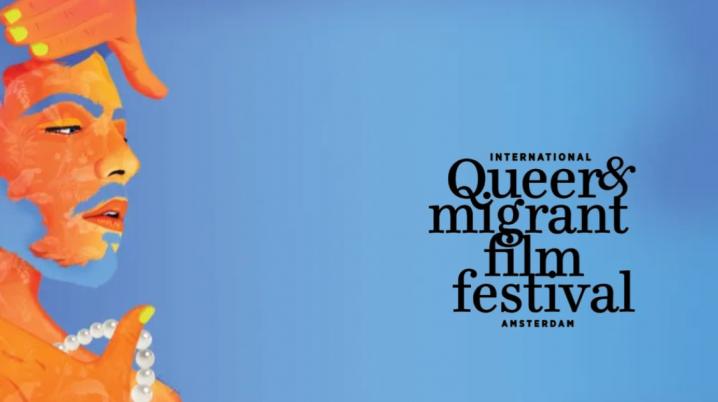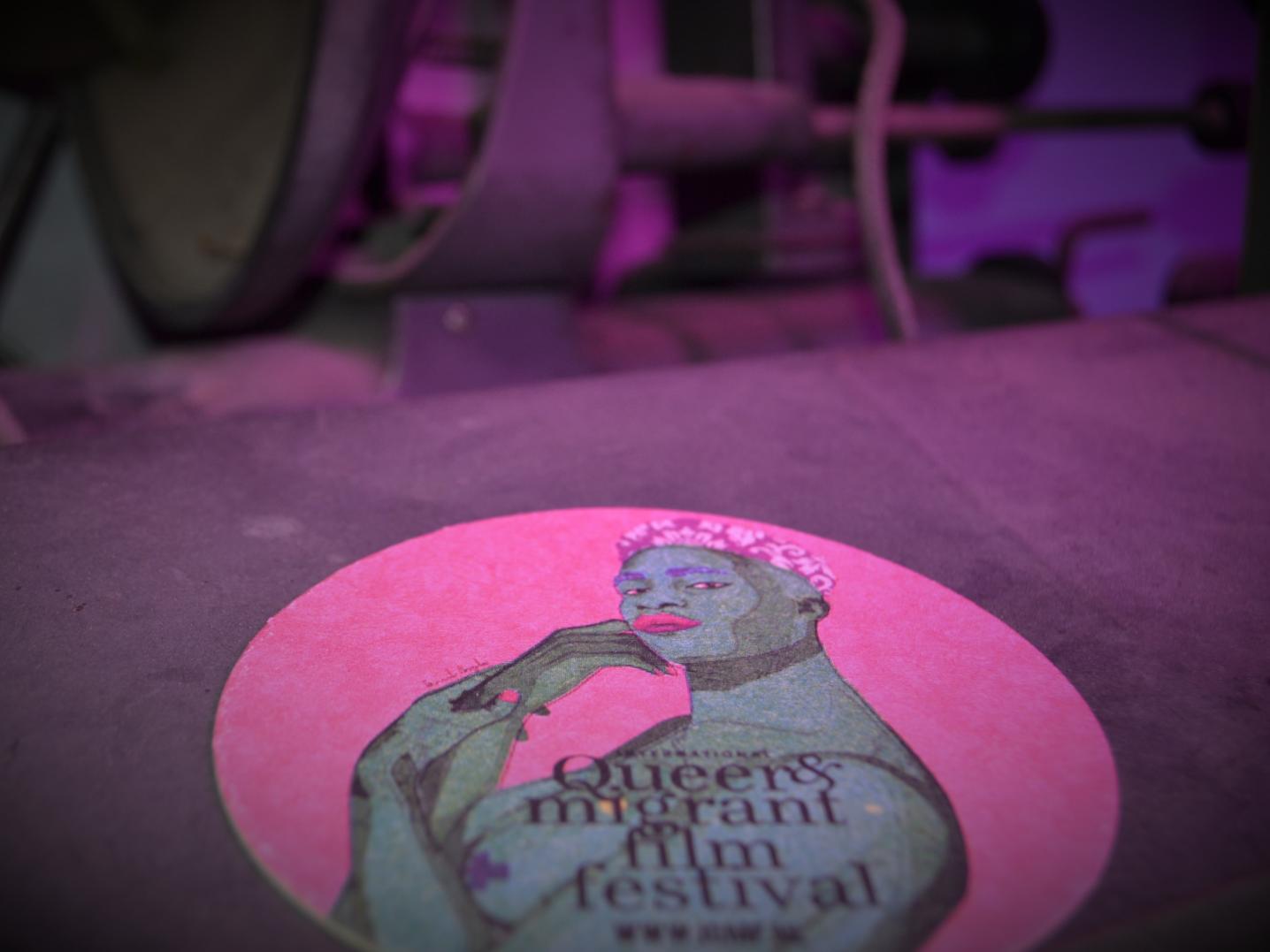
International Queer and Migrant Film Festival: A vibrant multidisciplinary festival on artivism
The International Queer and Migrant Film Festival (IQMF) aims for an inclusive society in which people of all genders, sexual preferences and nationalities enjoy equal human rights, freedom of movement and fair representation in the media. For 2 years, DutchCulture has been a proud partner of IQMF, co-hosting the festival’s panel talks. All of the festival’s talks can be viewed here.
This year, IQMF hosts its sixth edition. However, the contrast with previous crowded editions of IQMF could not have been bigger. Due to COVID-19 measures, the bar is closed and the screenings have a limited capacity. Nevertheless, the festival is as vibrant as ever. The programme includes many different fiction films, documentaries and shorts, and is accompanied by online talks, dance workshops, a performance, and even an online club night.
Hosting the festival partly online, partly offline has one big advantage, says Chris Belloni, IQMF’s director. “Our festival attracts an international audience, and this way, more people will be able to attend screenings and talks.” The film programme was also more widely accessible for a Dutch audience since people could screen films via Vitamine Cineville, Picl, and IQMF. The offline festival locations, a.o. LAB111, are festive due to the beautiful IQMF posters, but specifically because of the cheerful visitors, whose happy faces can still be seen, even with their facemasks on.
March for Dignity
The first film we watch is very impressive and immediately highlights the importance of IQMF. In March for Dignity, we see the organisers of Tbilisi Pride (Georgia), struggling to make their first-ever official pride march happen. We see footage of May 17 in 2013. An LGBT demonstration gets out of control when priests call other people to stop the demonstration from happening. The LGBT protestors are evacuated in yellow buses and we watch how the buses are attacked by many bystanders, smashing the windows and throwing rocks.
In the film, we follow the organisers of Tbilisi pride in 2019 and are witnesses to the violent resistance they encounter, due to which the pride has to be postponed several times. Six days before the initially planned pride, a prominent anti-LGBT activist delivers a speech in front of a large crowd: “We’ll tie their hands, using the belts we have with us. Today, we’ll self-organise ourselves, as civil troops.” Later, he adds: “I would like to warn our beloved policemen. Don’t make a mistake, brothers.”
In the end, the march takes place spontaneously, with very few people. It lasts for only about 15 minutes, the protestors are just in time to get away from violent far-right groups. One of the initiators tells us: “We had some important results, like visibility, we had great media coverage, and queer topics were discussed after our march. But the homophobia and transphobia in this country, especially in the older generation, is so deep-rooted, and it is so strong, it is very difficult to overcome.”
The film highlights how relevant it is that these stories are documented and told elsewhere and that international solidarity with LGBTQIA+ people everywhere is essential. March for Dignity can still be seen in Rotterdam on 29 December.

Who Speaks for Whom
After seeing March for Dignity, you might think that the Netherlands is a safe haven for LGBTQIA+ people. However, this is an all too easy and mistaken estimation. And it's exactly what the short film Limbo Paralegales addresses. In bold letters, the film tells us: “In the last 5 years a significant population of Latinx LGBTQIA+ people has arrived in the Netherlands. Of the thousands of cases of trans Latinx people seeking asylum, only a small number have managed to obtain official refugee status. Thousands live in illegality and/or bureaucratic limbos without knowing when their legal statuses will come or if one day this endless waiting will come to an end.” The film, produced by Papaya Kuir Collective, aims to highlight the reality of these people and inform society of their precarious lives. The film holds Europe and the Netherlands specifically responsible for pinkwashing against trans Latinx asylum seekers: “Wealthy western countries proclaim themselves as protectors and allies of LGBTQAI+ rights while denying the compulsive heteronormativity, discrimination, criminalisation and risk of death in which we lie back in our countries of origin.” Gay friendliness is something the Dutch proud themselves on, but simultaneously this image of pride hides the violence and danger that non-mainstream, marginalised LGBTQIA+ groups still face daily in the Netherlands.
Papaya Kuir Collective is part of the panel talk Who Speaks for Whom, in which Aynouk Tan, Sorab Roustayar and Mini Maxwell (Queer is not a manifesto) and Timothy Aarons (Caribbean Queer Salon) are also represented. Together, they reflect on the Dutch queer artivism scene. Timothy Aarons initiated the Caribbean Queer Collective in 2019: “I founded the collective since queer Caribbean people were reported about in a specific way in the Dutch media, and because of the perceptions Dutch people would have. If you don’t speak for yourself, people will make a narrative about you and this has consequences.” Aarons was able to organise four physical events before Corona, where people would talk about their issues. “Even if you talk about queer, Black People of Colour (BPOC) issues, there are several things specific to us. Immigration is a huge issue, the Dutch language, and understanding Dutch bureaucracy.”
Alexandra Ortiz (Papaya Kuir Collective) agrees: “There are many intricacies about being an immigrant, a queer immigrant, or a trans immigrant. You do not fit into the mainstream – not even into queer culture. You don’t know how to navigate the Dutch society. You do not know who to contact if you want to get hormones, for example. Most people speak English but very few people speak Spanish.” She adds: “There is one thing we really want Dutch queer people to understand, even BPOC or bicultural queer people: the needs of migrants can be different, we have our own special needs. That is why we must speak for ourselves. If we become part of a bigger narrative, our stories are erased.”
Moderator Jennifer Muntslag: “Are the right people in the right places? Who is missing?” Roustayar: “Within the mainstream LGBT community we are not being represented at all. We will represent ourselves. But we are not really able to properly organise ourselves. White people are pushing us down all the time, by silencing us, but also by not providing us with resources or money. We are trying to negotiate with white organisations so that we can have a table of our own.” Muntslag: “That is what they say, right? If you don’t have a seat at the table, build your own. But how does that work?” Roustayar: “If you don’t have the money and the resources, then it is fucking difficult. We want to build our own table, but to do so, we need to get the resources somehow.” Maxwell: “A friend of mine said; pass on the mic to white people. Namely, white people will not be convinced if I tell certain things, but they will if another white person tells the exact same things.”
The talk Who Speaks for Whom highlights how vital it is for (marginalised) groups within the LGBTQIA+ community to represent themselves and to form collectives. Additionally, the talk emphasises the importance that white (LGBTQIA+) people amplify their voices and provides resources so that these collectives can thrive. Many other lessons and significant observations were shared during the lively talk, which we highly recommend watching back in case you missed it.
Scenes I Imagine
During Saturday's panel talk Art Night Out, Simon(e) van Saarloos interviewed the director of the film Scenes I Imagine. In this film, we see different scenes from three Turkish films of the 1980s. The films supposedly have female friendships as its topic, but film director and producer Metin Akdemir questions this in their film. “When I put on my queer glasses, I find queer ambiguity,” they say. The film itself starts with Eve Kosofsky Sedgwick’s definition of queer: “Queer can refer to: the open mesh possibilities, gaps, lapsed and excesses of meaning when constituent elements of anyone’s gender, of anyone’s sexuality, can’t be made to signify monolithically.” Akdemir then introduces us to their question: are these films really about a friendship between two women, or is there something beyond friendship, that is censored in the film?
The films show us the original film scenes from the 80s, as well as interviews with its actors, the partner of the director of the films, academics and film critics. It’s funny to hear what they have to say about it, and how they viewed the scenes. “I didn’t really want to ground my hypothesis, I was after this research process,” Akdemir says. The film indeed is exploratory. There is no final answer to Akdemir’s question, but the process of asking the question to different people is an interesting process to watch. But there is more: “Even though these films are complete and finished, I still shot the scenes I imagined. This was a method to show queer possibilities.” In the film, we see scenes played by queer actors, that reimagine the scenes that may or may not have been censored in the original films. “The lesbian identity is always invisible in the LGBT+ movements in Turkey. There is no lesbian role model in our life. It is accepted by the public that there is no lesbianism, that’s why I was attracted to these movies. I also felt it was my responsibility to show queer lesbian people in this film,” Akdemir says.
IQMF’s programme addresses the heavy, difficult topics like discrimination, erasure and violence, but the festival also provides light and joyful moments and movies, such as Scenes I Imagine. The festival manages to create a cheerful atmosphere, wherein marginalised voices are amplified, beautiful and painful stories are shown and heard, and different members of the LGBTQIA+ community can connect with each other and learn from each other – despite the COVID-19 restrictions.
IQMF’s programme addresses the heavy, difficult topics like discrimination, erasure and violence, but the festival also provides light and joyful moments and movies, such as Scenes I Imagine. The festival manages to create a cheerful atmosphere, wherein marginalised voices are amplified, beautiful and painful stories are shown and heard, and different members of the LGBTQIA+ community are able to connect with each other and learn from each other – despite the COVID-19 restrictions.